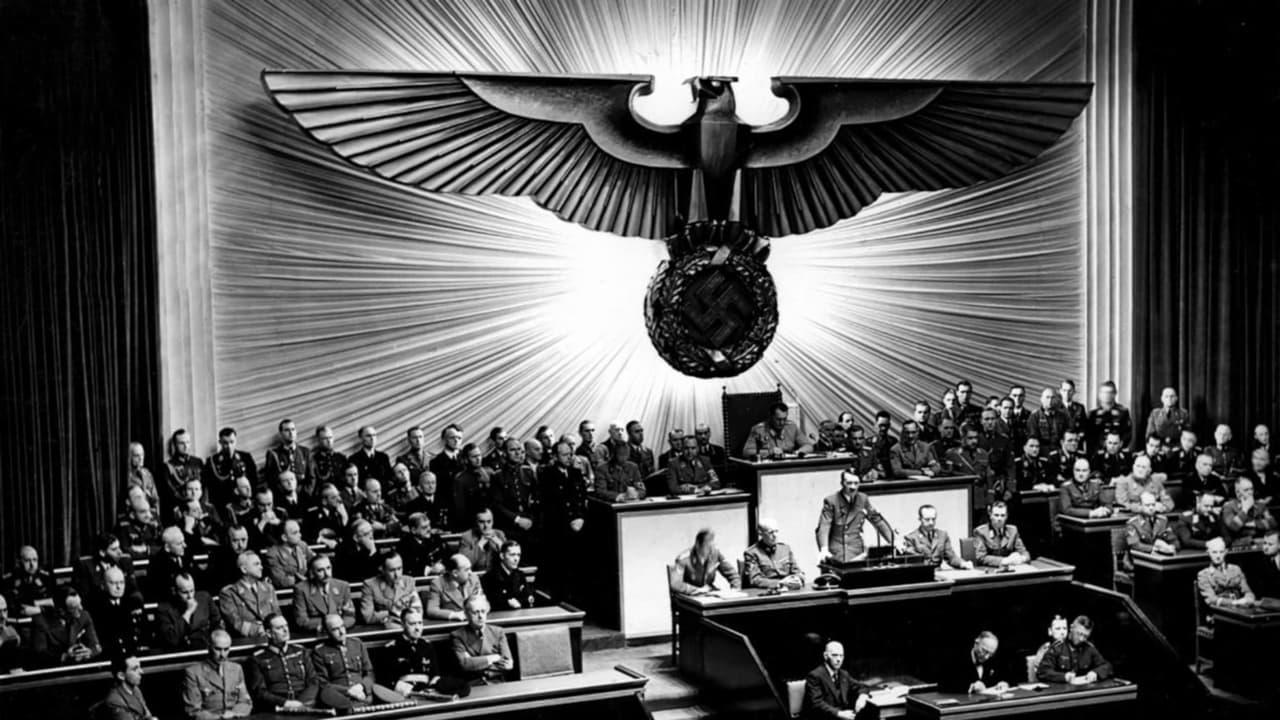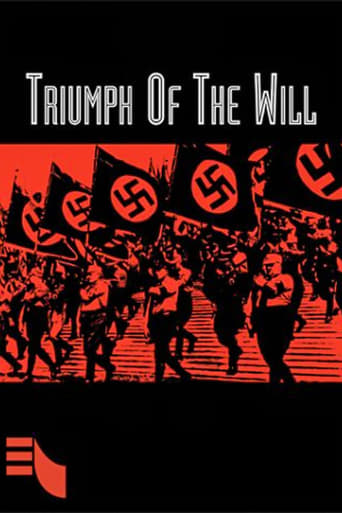



People are voting emotionally.
I have absolutely never seen anything like this movie before. You have to see this movie.
View MoreThe story, direction, characters, and writing/dialogue is akin to taking a tranquilizer shot to the neck, but everything else was so well done.
View MoreA terrific literary drama and character piece that shows how the process of creating art can be seen differently by those doing it and those looking at it from the outside.
View MoreI have to say this video is nothing but evil. I cannot rate more than 1 on it.
View MoreTriumph of the Will is a filmmaker's masterpiece in almost every way— especially cinematography and symbolism. You are not likely to see one Aryan in this film without a happy and proud smile on his face. It was made that way, don't you see? It's very likely that every frame of this film was edited and then approved by Hitler, himself, for tone and content. I'm also quite sure that many scenes of the film were added after the Nuremberg Rally had finished. Most of the crowd scenes were, no doubt, taken in real time. But the little determined drummer (@ 41:50") and that overjoyed lady running--with the little blond girl in her arms--to give flowers to Hitler (@ 6:21) were probably staged. (Does anyone notice that the woman is just giving those flowers to a German soldier's arms as he is riding in a car? Those arms could have been anyone's.) And, what about those cutaway shots to those "bright young faces"? I'm sure that, during the last 80 years, this propaganda film has been deconstructed and analyzed many times, as the technology for such analysis has become available. It seems as though almost everything in the film could have been re-created after the actual rally. What does that leave us that we can trust—the flags and banners being marched into the rally?
View MoreLeni Riefenstahl was hired by Hitler himself to produce a film that glorified the Nazi party, and she delivered in spectacular fashion. She needed 30 cameras to capture the pageantry of 1934's week-long, 700,000-strong Nuremberg Rally. The result is a film as tightly controlled as the paramilitary troops who march and salute on the grand stage of the arena designed by Albert Speer. Her masterful edit of the rich variety of images creates a film that ebbs and swells like a symphony. When it concludes, you will recall with surprise that, but for the rousing speeches by Hitler and others, it is pure cinema-- a sweeping array of images with music, but not one word of narration.Why, then, was the film described as "the most marvelous anti-Nazi propaganda" by the great film critic Dwight Macdonald? In his words:"When I saw all those people shouting Heil Hitler and Sieg Heil, I thought this is menacing and sinister. Those close-ups-- the porky, beefy, misshapen faces of the Nazi leaders, they are the faces of a bunch of crooks and murderers-- you can see that... There were some shots of Goering and Goebbels that you couldn't possibly admire. Nobody but a Nazi could admire these people." (From "Interviews with Dwight Macdonald," University Press of Mississippi, 2003).His conclusion was that Riefenstahl was "so good a director that she produces truth even when she wants to produce lies."When I watched "Triumph of the Will" again recently, I realized how strong Macdonald's words were. My heart hardened against what I was seeing, even though it was meant to glorify-- the frank close-ups of the stolid faces of those high-and-mighty men, men who are staged as individuals standing tall against rows upon rows of those paramilitary troops, the handsomest of whom get their own sunlit close-ups. If you're not one of them, if you're not a German chauvinist, it is a chilling, frightening picture of imperial power and rank submission.
View MoreI believe that a great film is a great film, no matter what its intent is. "Triumph of the Will" is practically the definition of an excellent work of cinema with awful intentions. It remains one of the most influential and important works of cinema and, without the Nazi propaganda masterpiece, today's cinema would be a bit different.It is one of the most monumental and epic films of all time, purely because of Leni Riefenstahl's filmmaking techniques. Using various, experimental camera angles, she documents a Nazi Party rally in a magical and breathtaking way.She films thousands of Nazi supporters from high helicopter shots, giving the audience the feeling as if we're flying with her camera. While it is a work of true evil, it is also a work of true beauty in it's visuals.It also manages to be one of the most unintentionally frightening films of all time. During the opening sequence, in which Hitler has arrived to the rally, it is terrifying seeing all of the excited, brainwashed Nazi supporters cheering him on, some of them actually being children! Knowing about all of the horrors that Adolf Hitler caused and committed, it truly is strange and disturbing to see things like that.Overall, this is a true gem of documentary/propaganda filmmaking and, no matter what your politics are, it is important for any true fan of cinema to see the film.
View More